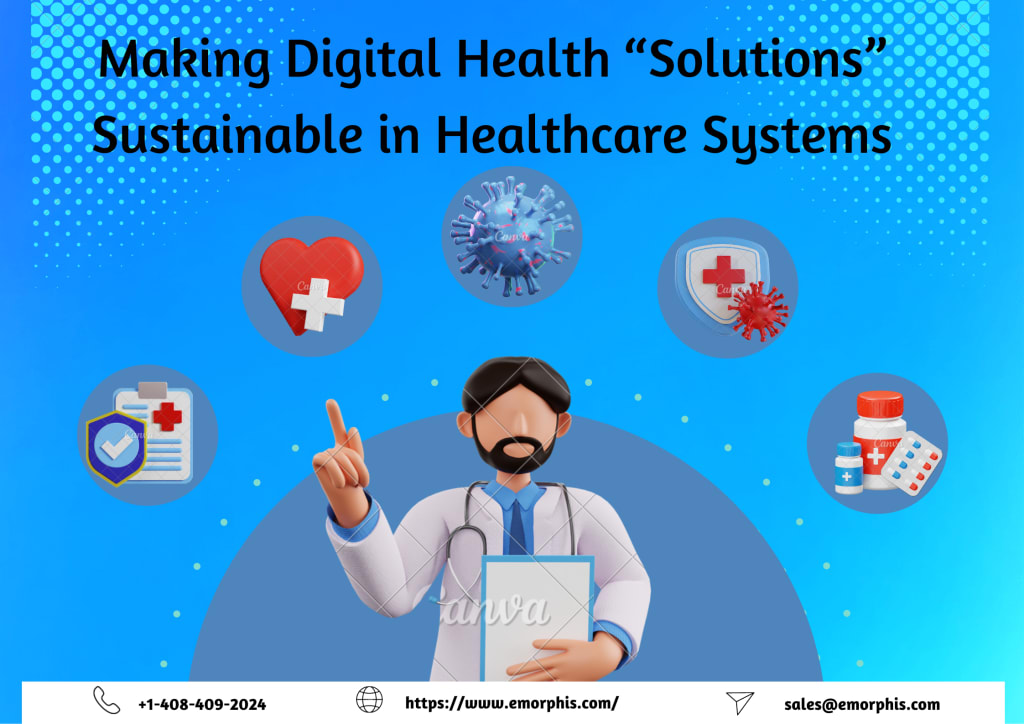Making Digital Health “Solutions” Sustainable in Healthcare Systems
Digital Health

Digital Health
Digital health is an emerging field of healthcare that focuses on the use of digital technology to improve and streamline the health care system. This technology includes electronic health records (EHRs), telemedicine, mobile health apps, wearables, and other digital tools. Digital health is a rapidly growing field as more and more people are starting to use technology to manage their own health and access medical care. There are many benefits to digital health, such as the ability to access health information quickly and easily, improved patient care, and cost savings.
Digital health helps to reduce the cost of health care by allowing for more efficient communication between health care providers and patients. It also makes it easier for patients to track and manage their own health, as well as receive reminders for regular check-ups and preventive care. In addition, digital health tools can help to reduce the burden of administrative tasks on health care providers, which can result in more time spent on patient care.
Digital health also has the potential to improve health outcomes by providing better access to information, better communication between health care providers and patients, and more personalized care. By allowing for more accurate and timely health data, digital health tools can help to identify health risks and intervene earlier to prevent adverse health events. Additionally, digital health can provide more personalized care, allowing for tailored treatment plans and better management of chronic conditions. Digital health also has the potential to reduce costs for both patients and health care providers. By providing more accurate data, digital health tools can reduce the amount of time spent on paperwork and administrative tasks, reducing costs associated with processing and storing health information.
Additionally, digital health tools can provide patients with better access to information and resources, allowing them to make informed decisions about their health care. Finally, digital health tools can help to bridge the gap between providers and patients, improving communication and increasing the quality of care. By providing patients with access to their health data and allowing them to connect with their health care providers, digital health can empower patients to take control of their health and make decisions that are best for them. Overall, digital health has the potential to revolutionize the way we deliver health care, providing better access, more personalized care, and improved outcomes. By harnessing the power of technology, digital health tools can help to improve the health of individuals and communities worldwide.
Digital Healthcare Solution
Digital healthcare solutions are transforming the way healthcare is delivered. With the development of the Internet and other digital technologies, healthcare providers and patients can now communicate, access and store data more quickly and easily than ever before. These solutions are making it easier for healthcare providers to provide care more efficiently, while also improving the quality of care and patient outcomes. Digital healthcare solutions range from electronic medical records (EMRs) and patient portals to telemedicine and telehealth. EMRs allow healthcare providers to store and retrieve patient medical information from any location. They also provide patients with access to their medical history, test results and prescriptions, enabling them to better manage their health. Patient portals allow patients to securely manage their medical records, schedule appointments and even access medical advice from their healthcare providers.
Telemedicine and telehealth solutions allow healthcare providers to connect with patients remotely. This can include video conferencing, remote monitoring, and even remote diagnosis, allowing patients to access healthcare services from their own home. Digital healthcare solutions also include artificial intelligence (AI) and machine learning technologies, which are helping providers to diagnose and treat illnesses more accurately. AI-based algorithms are being used to detect abnormalities in medical images and can even be used to identify disease patterns in medical records. Machine learning algorithms are being used to analyze vast amounts of medical data and identify trends in patient outcomes. In addition, AI can be used to automate administrative tasks such as scheduling appointments or managing medical records.
Digital healthcare solutions can also be used to improve patient engagement and communication. For example, telemedicine technologies allow patients to connect with their healthcare provider from the comfort of their own home. This reduces the need for time-consuming and costly trips to the doctor's office. In addition, mobile health apps can be used to remind patients to take medications, track their health data, and provide access to educational resources.
Finally, digital healthcare solutions can also be used to facilitate the delivery of quality healthcare. For example, cloud-based systems can be used to streamline data collection, storage, and analysis. This can improve the accuracy and timeliness of diagnosis and treatment. Additionally, healthcare providers can use analytics to identify high-risk patients and target interventions to improve outcomes. Overall, digital healthcare solutions are transforming the healthcare industry by improving access to care, increasing patient engagement, and facilitating the delivery of quality care.
Why digital health solutions are important?
Digital health solutions are important in today's world because they can help to improve the quality of healthcare, reduce costs, and increase access to care. Digital health solutions can provide more accurate diagnoses, reduce wait times, and provide more personalized care. They can also help to facilitate better communication between patients and healthcare providers and enable remote patient monitoring. Additionally, digital health solutions can be used to support better chronic disease management, improved patient engagement, and improved population health outcomes.
Benefits of digital health
1. Improved Access to Health Services: Digital health can provide improved access to health services, especially in remote and rural areas. Through digital health, healthcare providers can use telemedicine, which allows them to remotely diagnose and treat patients without having to be physically present.
2. Reduced Health Care Costs: Digital health can reduce health care costs by automating administrative tasks and streamlining workflows. This can allow healthcare providers to spend more time with patients and less time on paperwork.
3. Improved Quality of Care: Digital health can also improve the quality of care by providing real-time access to patient information, which can help healthcare professionals to make more informed decisions. Additionally, digital health can enable providers to monitor patients’ health remotely, which can help to identify potential issues earlier and improve treatment outcomes.
4. Increased Patient Engagement: Digital health can help to increase patient engagement by providing patients with more access to their own health data. This can allow them to better understand their health, take proactive steps to improve it, and make more informed decisions about their health care.
5. Improved Data Security: Digital health can also improve data security by using encryption and other security measures to ensure that patient data remains secure and private.
Challenges of digital health
1. Data privacy and security concerns: Digital health technologies generate large amounts of personal data and health information that must be securely stored and protected to ensure patient privacy and safety.
2.Inadequate user experience: Digital health solutions must be designed with user experience in mind, as user engagement is key to the success of digital health interventions.
3.Inaccurate data: Digital health solutions must be designed to collect accurate data to provide meaningful insights and actionable results.
4.Regulatory hurdles: Digital health solutions must comply with relevant laws and regulations, such as HIPAA, to be used in a healthcare setting.
5. Lack of evidence: Clinical evidence is needed to ensure that digital health solutions are effective and safe for patients. As digital health solutions are relatively new, there is a lack of clinical evidence to back up their use.
6. Privacy and security: Digital health solutions store and transmit sensitive patient data and must be secure to prevent data breaches.
7. Data management: Digital health solutions generate large amounts of data and require sophisticated analytics tools to analyse and make use of that data.
8. Interoperability: Digital health solutions must be able to communicate and share data with other systems, such as electronic health records, to be useful.
9. User access and adoption: Digital health solutions must be easy to use and must be adopted by both healthcare providers and patients to be effective.
10. Regulatory and reimbursement issues: Digital health solutions must comply with regulatory requirements and be eligible for reimbursement be successful.
Digital Healthcare Consulting
Digital healthcare consulting is a growing field of consulting services that provide advice and guidance to healthcare organizations on how to use digital technologies to improve patient care, increase efficiency, and reduce costs. This type of consulting is becoming increasingly important as healthcare organizations are looking to leverage technology to create a more effective and efficient care delivery system.
Digital healthcare consultants typically provide strategic advice and guidance on how to use digital technologies to improve patient care. This includes developing strategies to integrate digital technologies into existing workflows, helping organizations to implement digital solutions, and providing advice on how to best use digital technology to improve patient outcomes. In addition, they provide guidance on how to use digital technology to improve operational efficiency, reduce costs, and increase revenue.
Digital healthcare consultants also provide advice on how to use technologies such as artificial intelligence, machine learning, and big data to improve patient care. They may help organizations implement systems that can provide real-time data and insights on patient health, enabling them to make proactive decisions about care. Furthermore, they can provide guidance on how to use technology to automate administrative processes, streamline clinical workflows, and reduce paperwork.
Digital healthcare consultants can also help organizations develop strategies for implementing telemedicine services and other digital solutions. They can advise on how to best use these technologies to improve patient access to care, increase patient satisfaction, and reduce costs. Lastly, they can provide guidance on how to use digital technologies to create a better patient experience, from providing patient education and support, to utilizing digital tools to make it easier for patients to interact with their providers.
Overall, digital healthcare consulting is an important service that can help healthcare organizations to better leverage technology to improve patient care, increase efficiency, and reduce costs.
About the Creator
Larisa Albanians
Hey, a healthcare technology solutions provider at emorphis, that is helping organizations to deliver better healthcare solutions.






Comments
There are no comments for this story
Be the first to respond and start the conversation.